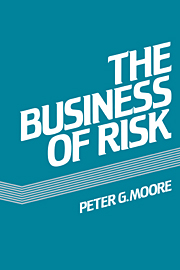Book contents
- Frontmatter
- Contents
- Preface
- 1 Introduction
- 2 The determination of probabilities
- 3 Subjective risk determination
- 4 Calibration and training
- 5 The concept of utility
- 6 Project investment risks
- 7 Risk and financial institutions
- 8 Risk and portfolio investment
- 9 Gambling and speculation
- 10 Physical risk and its perception
- 11 Morbidity and medicine
- 12 Risk in public policy
- Appendix A Handling probabilities
- Appendix B Decision-making procedures
- Appendix C Reduction of risks
- Exercises
- Bibliography
- Index
4 - Calibration and training
Published online by Cambridge University Press: 05 August 2012
- Frontmatter
- Contents
- Preface
- 1 Introduction
- 2 The determination of probabilities
- 3 Subjective risk determination
- 4 Calibration and training
- 5 The concept of utility
- 6 Project investment risks
- 7 Risk and financial institutions
- 8 Risk and portfolio investment
- 9 Gambling and speculation
- 10 Physical risk and its perception
- 11 Morbidity and medicine
- 12 Risk in public policy
- Appendix A Handling probabilities
- Appendix B Decision-making procedures
- Appendix C Reduction of risks
- Exercises
- Bibliography
- Index
Summary
Introduction
Two major difficulties arise in formulating risk assessments: first, a faulty or incomplete information base from which to make the assessment and, second, the limited and varied ability of individuals to process information presented to them. The faulty information base is discussed in Chapter 10 when looking at risk perceptions in situations of physical danger. In this chapter we consider the information-processing problem familiar to readers from situations which require the assembling of complex probabilities from a mass of simple probabilities. For example, in whist or bridge, some players consistently play against the odds, apparently being unaware of them in situations where their form is relatively complex.
Availability of information
The ease with which specific relevant instances can be recalled from memory affects markedly our judgement of relative frequency of events. The frequency of well-publicized events is commonly overestimated (for example, deaths due to cancer, deaths due to fires in offices or factories) while the frequency of less well-publicized events is underestimated (for example, deaths due to car accidents, or to diabetes). Moreover the chance availability of particular key pieces of information can affect the overall judgement. Most people have at some time been at a meeting where a member has thrown in a single isolated scrap of information which has then had a marked effect on the estimate of some uncertain quantity and affected the subsequent decision taken; the other members present at the meeting may well have found it difficult to put the piece of information in proper perspective.
- Type
- Chapter
- Information
- The Business of Risk , pp. 49 - 62Publisher: Cambridge University PressPrint publication year: 1983



